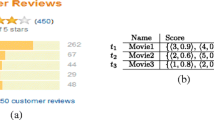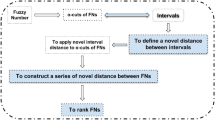Abstract
Recently, uncertain data have received dramatic attention along with technical advances on geographical tracking, sensor network and RFID etc. Also, ranking queries over uncertain data has become a research focus of uncertain data management. With dramatically growing applications of fuzzy set theory, lots of queries involving fuzzy conditions appear nowadays. These fuzzy conditions are widely applied for querying over uncertain data. For instance, in the weather monitoring system, weather data are inherent uncertainty due to some measurement errors. Weather data depicting heavy rain are desired, where “heavy” is ambiguous in the fuzzy query. However, fuzzy queries cannot ensure returning expected results from uncertain databases.
In this paper, we study a novel kind of ranking queries, Fuzzy Ranking queries (FRanking queries) which extend the traditional notion of ranking queries. FRanking queries are able to handle fuzzy queries submitted by users and return k results which are the most likely to satisfy fuzzy queries in uncertain databases. Due to fuzzy query conditions, the ranks of tuples cannot be evaluated by existing ranking functions. We propose Fuzzy Ranking Function to calculate tuples’ ranks in uncertain databases for both attribute-level and tuple-level uncertainty models. Our ranking function take both the uncertainty and fuzzy semantics into account. FRanking queries are formally defined based on Fuzzy Ranking Function. In the processing of answering FRanking queries, we present a pruning method which safely prunes unnecessary tuples to reduce the search space. To further improve the efficiency, we design an efficient algorithm, namely Incremental Membership Algorithm (IMA) which efficiently answers FRanking queries by evaluating the ranks of incremental tuples under each threshold for the fuzzy set. We demonstrate the effectiveness and efficiency of our methods through the theoretical analysis and experiments with synthetic and real datasets.
Similar content being viewed by others
References
Deshpande A, Guestrin C, Madden SR, Hellerstein JM, Hong W (2004) Model-driven data acquisition in sensor networks. In: Proceeding of VLDB, pp 588–599
Jin C, Yi K, Chen L, Yu JX, Lin X (2010) Sliding-window top-k queries on uncertain streams. VLDB J 19:411–435
Rè C, Dalvi N, Suciu D (2007) Efficient top-k query evaluation on probabilistic data. In: Proceeding of ICDE, pp 886–895
Xu C, Wang Y, Lin S, Gu Y, Qiao J (2010) Efficient fuzzy top-k queries over uncertain objects. In: Proceeding of DEXA, pp 167–182
Own CM (2009) Switching between type-2 fuzzy sets and intuitionistic fuzzy sets: an application in medical diagnosis. Appl Intell 31(3), 283–291
Li F, Yi K, Jestes J (2009) Ranking distributed probabilistic data. In: Proceeding of SIGMOD, pp 361–374
Cormode G, Li F, Yi K (2009) Semantics of ranking queries for probabilistic data and expected ranks. In: Proceeding of ICDE, pp 305–316
Ming H, Pei J, Zhang W, Lin X (2008) Ranking queries on uncertain data: a probabilistic threshold approach. In: Proceeding of SIGMOD, pp 673–686
Valova I, Milano G, Bowen K, Gueorguieva N (2010) Bridging the fuzzy, neural and evolutionary paradigms for automatic target recognition. Appl Intell
Li J, Saha B, Deshpande A (2011) A unified approach to ranking in probabilistic databases. VLDB J 20:249–275
Yi K, Li F, Kollios G, Srivastava D (2008) Efficient processing of top-k queries in uncertain databases with x-relations. IEEE Trans Knowl Data Eng 20(12):1669–1682
Zadeh LA (1965) Fuzzy sets. Inf Control 8(3):338–353
Soliman MA, Ilyas FI (2007) Top-k query processing in uncertain databases. In: Proceeding of ICDE, pp 896–905
Cheng R, Kalashnikov DV, Prabhakar S (2004) Querying imprecise data in moving object environments. IEEE Trans Knowl Data Eng 16(9):1112–1127
Cheng R, Chen J, Mokbel MF, Chow C-Y (2008) Probabilistic verifiers: evaluating constrained nearest-neighbor queries over uncertain data. In: Proceeding of ICDE, pp 973–982
Qiao S, Tang C, Jin H, Long T, Dai S, Ku Y, Chau M (2010) Putmode: prediction of uncertain trajectories in moving objects databases. Appl Intell 33:370–386
Chen SM, Jong WT (1997) Fuzzy query translation for relational database systems. IEEE Trans Syst Man Cybern, Part B, Cybern 27(4):714–721
Bernecker T, Kriegel HP, Mamoulis N, Renz M, Zuefle A (2010) Scalable probabilistic similarity ranking in uncertain databases. IEEE Trans Knowl Data Eng 22(9):1234–1245
Ge T, Zdonik S, Madden S (2009) Top-k queries on uncertain data: on score distribution and typical answers. In: Proceeding of SIGMOD, pp 375–388
Bodenhofer U, Küng J, Saminger S (2006) Flexible query answering using distance-based fuzzy relations. In: Theory and Applications of Relational Structures as Knowledge Instruments, pp 207–228
Tahani V (1977) A conceptual framework for fuzzy query processing—a step toward very intelligent database systems. Inf Process Manag 13(5), 289–303
Lian X, Chen L (2008) Probabilistic ranked queries in uncertain databases. In: Proceeding of EDBT, pp 511–522
Lian X, Chen L (2009) Top-k dominating queries in uncertain databases. In: Proceeding of EDBT, pp 660–671
Takahashi Y (1991) A fuzzy query language for relational databases. IEEE Trans Syst Man Cybern 21(6):1576–1579
Ma ZM, Mili F (2002) Handling fuzzy information in extended possibility-based fuzzy relational databases. Int J Intell Syst 17(10):925–942
Ma ZM, Yan L (2007) Generalization of strategies for fuzzy query translation in classical relational databases. Inf Softw Technol 49(2):172–180
Author information
Authors and Affiliations
Corresponding author
Rights and permissions
About this article
Cite this article
Xu, C., Wang, Y., Gu, Y. et al. Efficient fuzzy ranking queries in uncertain databases. Appl Intell 37, 47–59 (2012). https://doi.org/10.1007/s10489-011-0312-1
Published:
Issue Date:
DOI: https://doi.org/10.1007/s10489-011-0312-1




